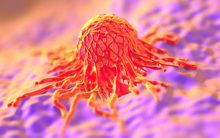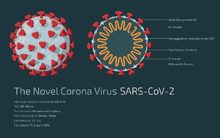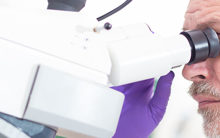On 11 September, we welcomed a new cohort of fellows to the College at the New Fellows Ceremony. At this event, we also awarded 2 College Research Medals for outstanding research work undertaken by pathologists or scientists in training.
The awards are open to all trainees or scientists registered with the College or a UK Regulatory Council for training purposes during the year the submitted paper was published.
Dr Joe Westaby, NIHR Clinical Lecturer in Cardiac Histopathology, was awarded the College’s Silver Research Medal for his research into obesity cardiomyopathy. We interviewed Joe to find out more about his research, the impact it could have on the wider field and how he envisages pathology will evolve over the next decade.

Can you tell us a bit about your background? What drew you to pathology, and histopathology in particular?
I started out doing a BSc in Molecular Biology and Biochemistry with a thesis on hypertrophic cardiomyopathy, which developed my interest in cardiac disease. This was followed by an MSc in Molecular Biology and Pathology of viruses, in which I was based in a histopathology laboratory for the thesis on liver fibrosis in hepatitis C.
I went on to do postgraduate medicine and did a special study module in forensic and coronial medicine. During my foundation programme I maintained an interest with placements in haematology and chemical pathology with histopathology, as well as attending autopsies. I chose histopathology because I particularly enjoyed the challenge of diagnosis and understanding the underlying pathology processes.
During training, I successfully applied for a National Institute of Clinical Research (NIHR) academic clinical fellowship, which was based in the Cardiac Risk in the Young Cardiovascular Pathology Laboratories at St George’s, University of London. I have now progressed through a PhD and become an NIHR clinical lecturer. My research has focused on sudden cardiac death and cardiovascular disease.
You won the RCPath Silver Research Medal for your research and paper, centred around the role of obesity cardiomyopathy in sudden cardiac death. Are you able to summarise this research and what you discovered?
The paper describes a new condition that affects obese people and can result in them dying suddenly, which we have labelled as obesity cardiomyopathy. The heart is thought to enlarge secondary to obesity and this heart enlargement is linked to an increased risk of a lethal abnormal heart rhythm. We have provided diagnostic criteria that should allow other pathologists to reproducibly make the diagnosis. Furthermore, we suggest that future genetic testing and evaluation of family members will help to establish whether it may be partially genetic or whether it is purely due to obesity.
How do you hope this research will impact the wider pathology field, and influence patient care or clinical practices in the future?
We hope to conduct further research to establish whether there is a genetic predisposition to developing an enlarged heart in obesity, or whether it is purely an acquired disease. We will aim to establish its heritability through genetic testing and screening of blood relatives. This will determine whether guidelines should be produced to suggest that blood relatives are screened by a cardiologist following identification of the condition.
What’s the most rewarding part of your work? Conversely, what part do you find the most challenging?
The most challenging part of my work is the tragedies of young people dying suddenly and unexpectedly. However, the most rewarding part is knowing that by diagnosing conditions, we aid with the detection of cardiac disease in the living and potentially help prevent future deaths.
In your opinion, what are the most pressing challenges or unanswered questions in pathology/histopathology research today?
We are in an era of rapid development where we will see the integration of artificial intelligence, digital image analysis and whole genome analysis. This will hopefully allow us to address many challenges and questions, including improving diagnostic and prognostic capabilities, the role of polymorphisms in the development of disease, alongside the development of new early biomarkers of disease. One of the most pressing challenges is the current workload for pathologists, and artificial intelligence assistance may help to streamline histological analysis.
How do you see the field of pathology evolving over the next decade? Are there any emerging technologies or approaches that excite or interest you?
I think the microscope will cease to be a tool for histopathology and we will move to using computer screens to examine slides. This will also enable the use of artificial intelligence to pre-screen slides. I think combining technologies such as artificial intelligence, digital imaging and whole genome analysis may increase our understanding of the pathogenesis of disease, as well as our diagnostic abilities.
For you, what is the most valuable aspect of being a member of the College?
I am very appreciative of the College for helping to develop and maintain high standards of education and training, which has allowed me to complete all the training examinations. The College is very important for professional networking and as a reference for guidelines and standards. I think the most important aspect is that the College advocates for the profession and its members, helping to shape government policies and ensure that the needs of pathologists are addressed.
How do you hope the College will support you and the wider profession throughout your career?
It is important that the College continues to advocate for the profession, driving change through contributing to government policy on behalf of all pathologists. I also hope to establish a cardiac pathology training scheme, which perhaps the College could recognise in the future.
The next Research Medal awards will be presented at a College ceremony in 2025. Please click here for more information on the next round of applications.
Part of the College’s mission is to promote study, research and innovation within the field of pathology. We support research and innovation in pathology in various ways, including funding undergraduate and postgraduate students at the beginning of their research project through our Research Fellowship Start-up Grant. We also promote research funding opportunities available for trainees and fellows.
We are committed to representing our members, their stories and experiences, from across their broad range of specialties and backgrounds. If you are a College member with a story to tell, we would love to hear from you. Please get in touch with the Member Engagement and Support team at [email protected].






